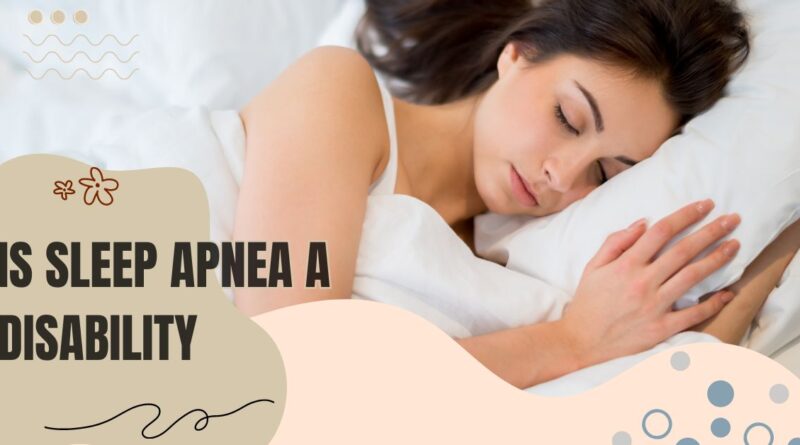Is Sleep Apnea a Disability
Introduction
Sleep apnea is the most serious of sleep disorders, in which the sleeper’s breathing stops and resumes repeatedly during sleep. It affects millions of people worldwide and goes beyond just being tired. They might wonder whether sleep apnea would be classified as a disability since, indeed, it significantly impairs their daily lives. In this article, we will discuss whether sleep apnea is considered a disability, how it relates to health issues, and what legal protections are afforded to those who are afflicted.
What is Sleep Apnea?
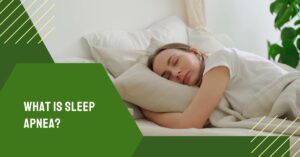
Sleep apnea is the condition where there is a blocking of airflow to some part of the airway or when the brain fails to provide an appropriate signal for breathing during sleep. There are three classifications: obstructive, central, and complex; most commonly, it is referred to as obstructive sleep apnea, or OSA. Find out how sleep apnea impacts interpersonal living, and read about advances in the Pink Eraser breast cancer vaccine.
Key Points:
- Breathing stopped temporarily: oxygen levels drop because of this.
- Sleep Patterns Are Interrupted: A person will wake up gasping for oxygen.
- Severe Health Complications: Untreated sleep apnea can lead to heart disease, stroke, and high blood pressure.
How Does Sleep Apnea Affect Daily Life?
Sleep apnea can make life very tricky to manage. Fatigue is a feeling that prevails, making concentration and memory, plus mood, impossible to manage.
Key Points:
- Chronic Fatigue: You may feel tired despite the full ability to get a night’s sleep.
- Difficulty in Concentrating: It hampers your attention.
- Mood Swings: Irritability and depression often characterize the sufferer.
How Do I Know When Sleep Apnea Is a Disability?
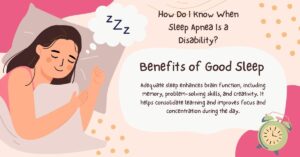
Sleep apnea may be an impairment for the purposes of such laws if it significantly restricts major life activities. Their legal qualification would depend on how it impacts you at work and in other aspects of your life.
Key Points:
- You could not work full-time because of sleep apnea.
- A diagnosis by a physician can support your assertions of disability.
- A condition is more likely to be an impairment if it is more severe.
Legal Protections for Victims of Sleep Apnea
Some cases of sleep apnea can qualify for protection through the Americans with Disabilities Act (ADA) or other legal protection legislation.
Points to Note:
- Duty Accommodations: Employers are responsible for making changes
- Social Security Disability Benefits: There are benefits to award to more significantly affected patients.
- Legal Concepts: Country by country, there’s varying disability legislation that plays out in determining a patient’s qualification.
Sleep Apnea Diagnosis
A sleep study by a healthcare provider would be required for an accurate diagnosis. A diagnosis of sleep apnea would be helpful in determining the level of severity of sleep apnea and disability level.
Key Take-Aways
- Sleep Studies: This measures breathing and oxygen level.
- Medical History: Symptoms, Risk Factors
- CPAP and Other Treatments: Some treatments may alleviate symptoms.
Common Treatments for Sleep Apnea
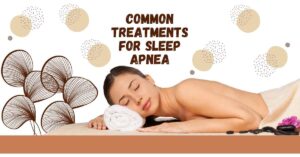
Treatment of sleep apnea varies based on the type and severity of the condition. The primary treatment options include CPAP machines, lifestyle changes, and surgeries.
Key Points:
- CPAP Machines: These ensure that the air passage remains open during sleeping.
- Weight loss and lifestyle changes: A healthy lifestyle decreases the symptoms.
- Surgery: In some cases, surgery is required to enhance physical blockages.
How Sleep Apnea Affects Other Health Conditions
Sleep apnea isn’t just causing drowsiness. It tends to worsen health conditions such as high blood pressure, diabetes, and heart diseases.
Key Points:
- A potential risk for heart disease: There’s a lack of oxygen that would strain the heart.
- An aggravation of high blood pressure: sleep apnea will cause the blood pressure to shoot up.
- Complications in diabetes: The disease can prove hard to regulate the sugar levels in your blood.
Can You Work with Sleep Apnea?
Many of those patients with sleep apnea remain productive at work, although marked symptoms may sometimes interfere with or even prevent employment.
Key Points
- Daytime Somnolence: Impacts work performance and work safety.
- Workplace Accommodations: Such as flexible hours or telecommuting.
- Jobs: Unsafe for people afflicted with untreated sleep apnea, such as, for example, operations involving heavy machinery.
Disability Benefits for Patients with Sleep Apnea
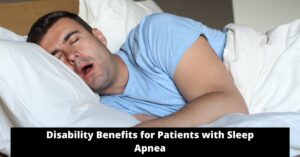
If sleep apnea proves to disrupt your lifestyle heavily, then it can earn you disability benefits. These could either be government subsidies or private insurance benefits.
Key Points:
- Eligibility for Social Security Disability: Can be considered in severe cases.
- Insurance Benefits: Some policies offer treatments for sleep apnea.
- Disability Income Benefits: Will help with living costs and medical bills.
Living with Sleep Apnea and Coping with the Condition
The difficulties of living with sleep apnea have been deciphered. Early diagnosis, treatment, and lifestyle changes can improve the quality of your life.
Points:
- CPAP at All Times: It can prevent the symptoms.
- Healthy Lifestyle: Good exercise and dieting make a difference.
- Follow Up: A good follow-up is done through regular check-ups for the fact that the treatment is going right.
Social Security Disability Benefits for Sleep Apnea
Sleep apnea is considered for Social Security Disability benefits when it dramatically impacts regular life and work. According to the Social Security Administration, sleep apnea will be considered a disability if it prevents full-time work and complies with other strict medical standards.
Key Takeaways
- Evidence of Severity: Medical documents should reflect that sleep apnea limited daily life.
- Work Limitation: It should impair your ability to perform at work.
- Long-Term Effects: Conditions, including heart disease, may put you at higher risk.
Disability Insurance for Sleep Apnea
Beyond Social Security disability, other disability insurance might be in effect if sleep apnea renders you unable to work or live a normal life. For instance, private health care programs might include a form of disability income if sleep apnea is found to affect your ability.
Important Facts:
- Private Insurance: Some policies include long-term disability benefits for sleep apnea.
- Company Benefits: Do you have an employer with accommodations or a short-term disability?
- State Programs: Some states have special programs for sleep disorder disability.
Which Disability Benefits Am I Eligible to Claim for Sleep Apnea in the UK?
UK residents who are suffering from sleep apnea may be eligible to receive a lot of benefits, including Personal Independence Payment (PIP) or even Employment and Support Allowance (ESA). These all depend on how much the condition disables your daily activity and your capability for work.
Important Points
- Eligibility for PIP: This is mainly based on how sleep apnea affects your independence.
- ESA Support: Provides compensation in the event that you are unable to work.
- Other Benefits: There may be other benefits in the way of Blue Badges and other amenities where severe conditions have been identified.
Sleep Apnea VA Disability Rating
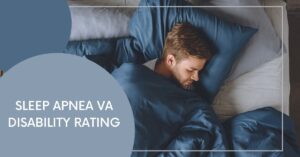
There is a potential for the Department of Veterans Affairs to offer disability compensation to the veterans who suffer from sleep apnea. The disability rating can vary with the severity, and high ratings enable higher compensation.
Key Points:
- SAR Utilization: Most disabled veterans are rated at 50% if they utilize a SAR to sleep.
- More Severe Conditions: More serious conditions that may require surgery are rated higher.
- Medical Evidence: If a VA physician diagnosed the condition, then there is more evidence in that area.
Can You Work with Sleep Apnea?
For most individuals, sleep apnea is consistent with working full-time careers again with the severity and medical treatment. In some cases, sleep apnea can lead to extreme daytime sleepiness and a disorganized thought process that makes people not able to do some jobs.
Key Points
- Telecommuting or alternative schedules can be useful.
- Some professions are hazardous, like using or working with machines.
- Number of Treatments: If you can have a good treatment, such as CPAP, there is a high chance that your employment will enhance dramatically.
Is Obstructive Sleep Apnea a Disease?
Obstructive sleep apnea is considered a medical illness, but its causation is more similar to other illnesses, for example, obesity, heart disease, and high blood pressure. It is not something you get as you would get the flu; it is more of a chronic, creeping illness that can be treated.
Critical Points:
- Chronic Disease: Obstructive sleep apnea is a chronic disease.
- Comorbidity: Most of the time it is co-related with other diseases in the body.
- Treatable Condition: Sleep apnea can be controlled through proper treatment.
Is Severe Sleep Apnea Dangerous?
Severe sleep apnea is more than a nuisance and can be life-threatening. Individuals who have severe forms of the disorder stand liable to suffer from heart disease, stroke, and sudden death due to the cycles of non-breathing occurring continuously.
Key Points:
- Risk of Hearts: Oxygen deficiency is an additional stress to the heart.
- Risk of Stroke: Sleep apnea increases the chances of suffering a stroke.
- Sudden Death: In extreme cases, sleep apnea can cause sudden death during sleep.
Conclusion:
For its most severe forms, sleep apnea can play a central role in one’s life and health. Whether it is considered a disability or not depends on the severity of the condition and the impact that it has on your ability to work or carry out any other activity. It might have an educational role for victims to alert them regarding the potential gains—from Social Security to veterans’ compensation and the UK to pay on those with ‘disability’. Though curable, the worst form requires very close observation to avoid other serious health issues.

